30.09.2007: Delhi
We visited Muni Sumermalji who stayed in Oshwal Bhawan in East-Delhi for his Chaturmas. Munishree is a master of deep relaxation (Kayotsarga) and mantra meditation. Swami Dharmanandji kindly translated our talk. Muni Sumermalji in his Chaturmas aims the first two months to mainly advance in his own meditation practice, the next two months he mainly is teaching others. Swami Dharmanandji’s comment was, “First learn to swim, then teach others.”
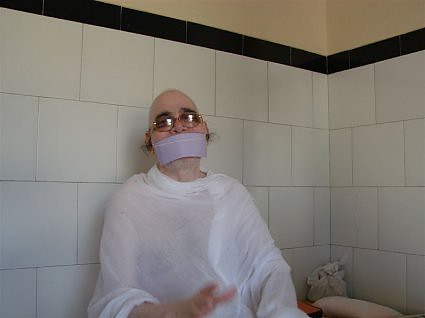
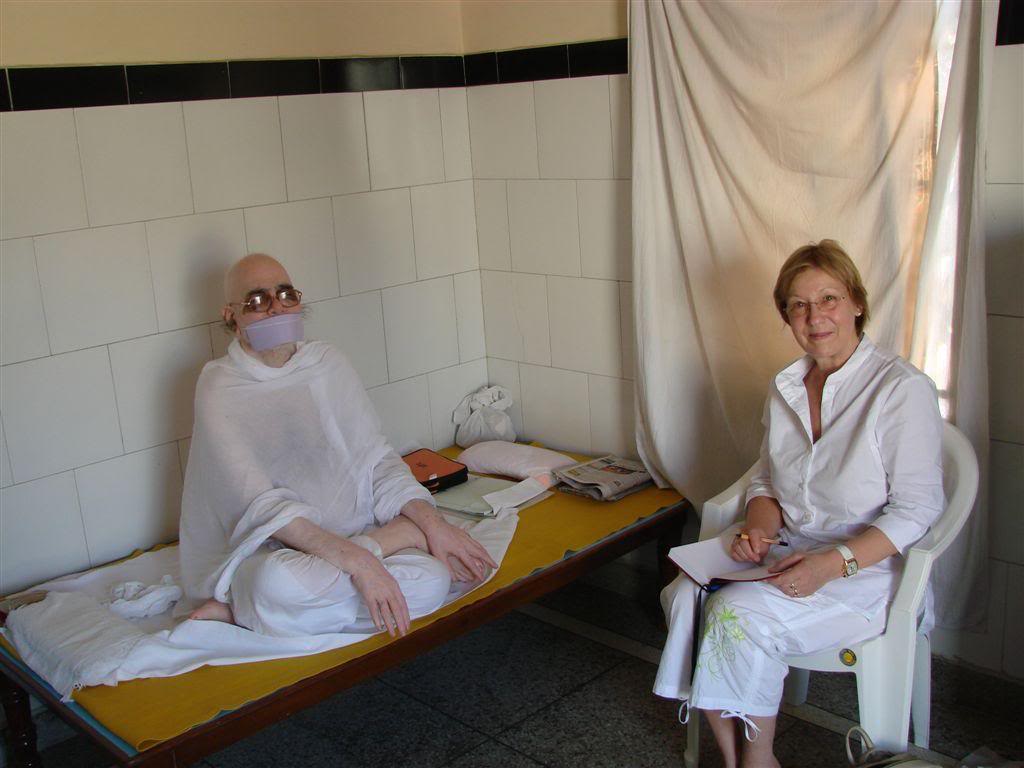 Muni Sumermal, Karuna
Muni Sumermal, KarunaI was eager to know about the spiritual experiences of a Jain monk totally living Ahimsa in his thoughts, words, and actions. Munishree is daily practising two times deep relaxation for 45 minutes, and mantra meditation for 30 minutes. In mantra meditation, he focuses his attention to a psychic centre while reciting the mantra.
Sometimes, he recognises glimpses of truth during his spiritual exercises. In these moments, his body is all over raying with white light, the environment also is white, and all inside and outside feels immaterial. Hearing this, I closed my eyes in a reflex and for one moment, I saw a little white light in the centre of enlightenment in the middle of the forehead. It was then when I started understanding what Munishree was talking of, and with how much patience and devotion he is on his spiritual path.
When I asked him if he means this white mentioned in descriptions of near death experiences, he responded that he neither was near death nor dead so far.
I was impressed by Munishrees modesty and his aura. He only expresses himself on the base of his own experiences and makes clear that they only are parts of reality. For me he is someone who has integrated the multi-perspectivity of truth into his day-to-day life. His serious response to my perhaps silly sounding questions inspired this view..
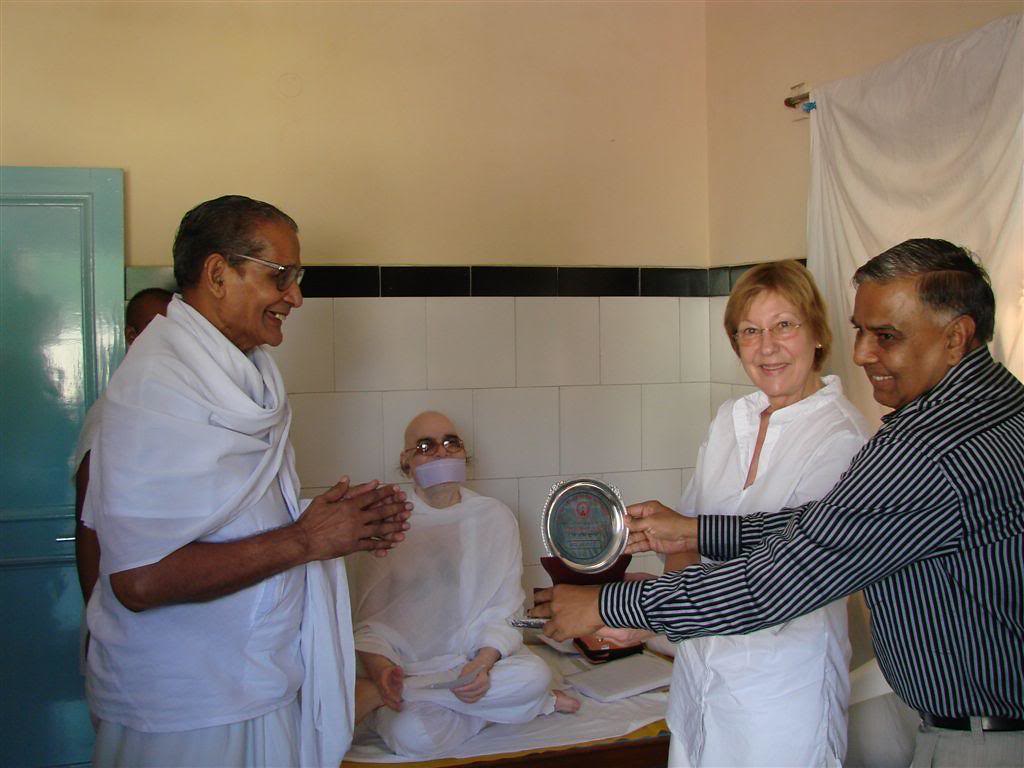 Swami Dharmananda, Muni Sumermal, Karuna, Shri Babulal, secretary of Terapanth Sabha, handing over memento of visit to Muni Sumermal to Karuna
Swami Dharmananda, Muni Sumermal, Karuna, Shri Babulal, secretary of Terapanth Sabha, handing over memento of visit to Muni Sumermal to Karuna
Shri Babulal, secretary of East Delhi Terapanth Mahasabha offered a memento of this visit to Munishree to me. Muni Sumermalji is a highly appreciated saint and has initiated already three monks by the order of Acharya Mahaprajnaji, among them in 1974 Yuvacharyashree. In general, Acharya Mahaprajnaji himself is giving Diksha to monks, but there are some exceptions. Self-understood, all monks are his disciples, no matter who initiated them.
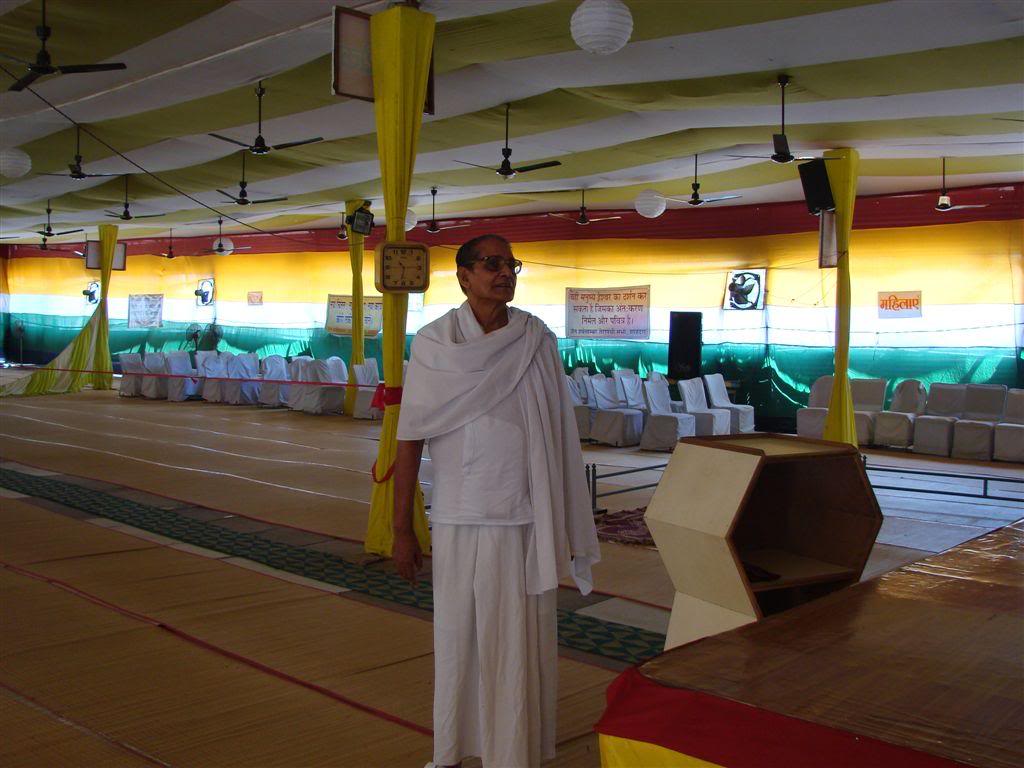 Swami Dharmananda in assemblee tent
Swami Dharmananda in assemblee tent Assembly hall
Assembly hall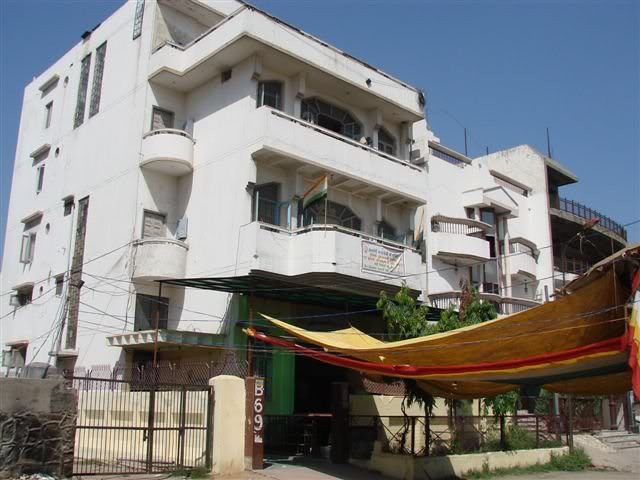
Then the building was shown to us. Erected in 1985 across Yamu river, Oshwal Bhavan is used for religious and social purposes. During the four month of raining season, the saints are not travelling and stay in Bhawans like this. Actually, Muni Sumermal is staying with his group of four monks. His daily lectures are so well attended that a tent had to be erected for the numerous audience.
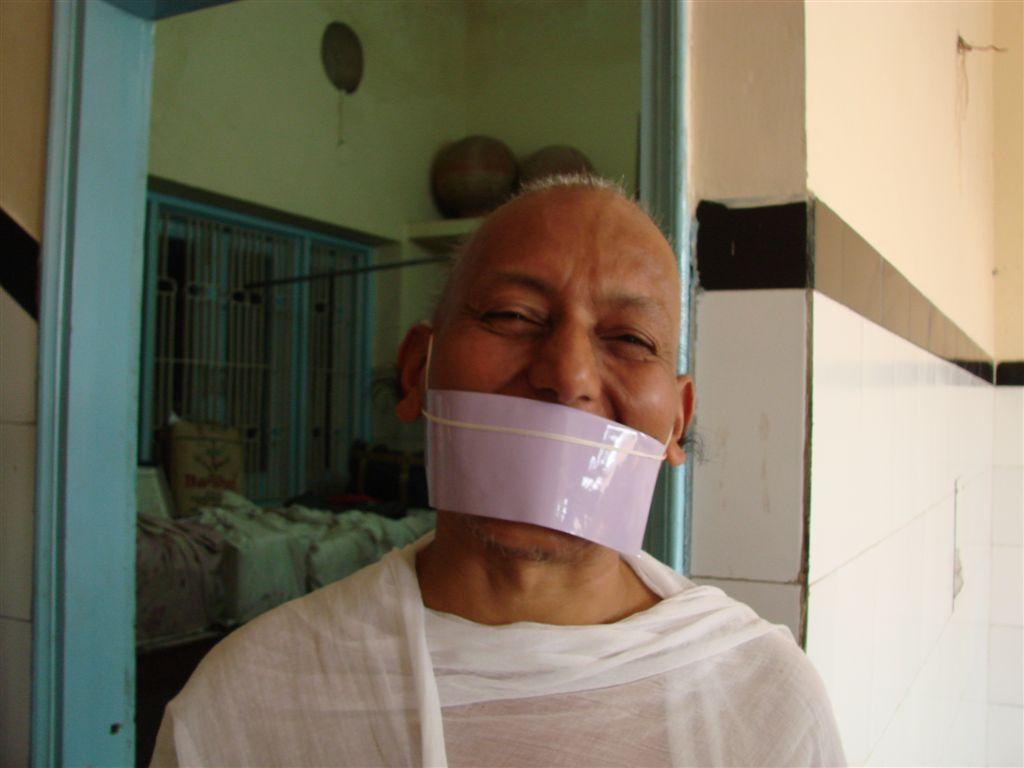
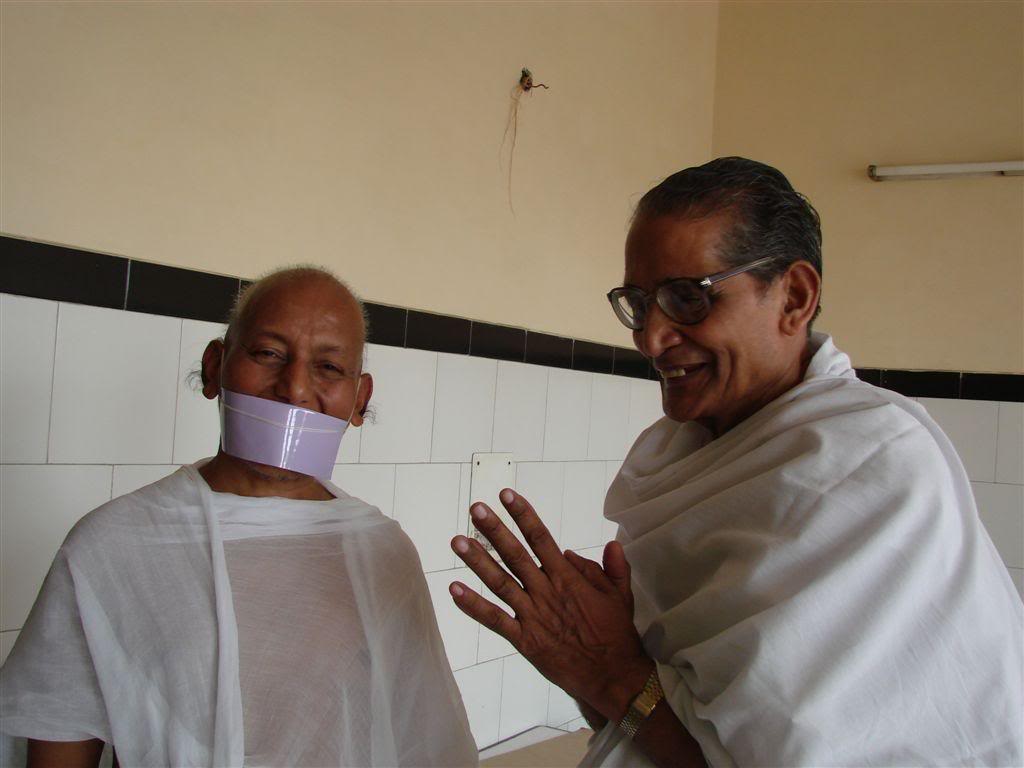 Muni Vijay Kumar & Swami Dharmananda
Muni Vijay Kumar & Swami Dharmananda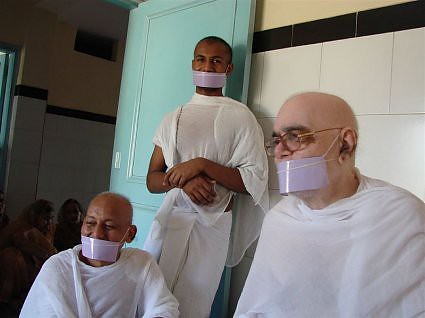 Muni Sumermal, Muni Vijay Kumar, and the youngest Muni in Muni Sumermal's group
Muni Sumermal, Muni Vijay Kumar, and the youngest Muni in Muni Sumermal's groupMuni Sumermal ji is head and senior person of his group. Muni Vijay Kumar ji is travelling since 25 years with Muni Sumermal ji, he has authored many booklets on how to live a happy and meaningful life, two of them have been rendered into English language. Just before I could ask for name and details of the third monk we met there, it was time to leave for the next event for which Muni Udit Kumar ji and Muni Prasham Kumar ji of Muni Sumermal ji´s group had already left in the morning.
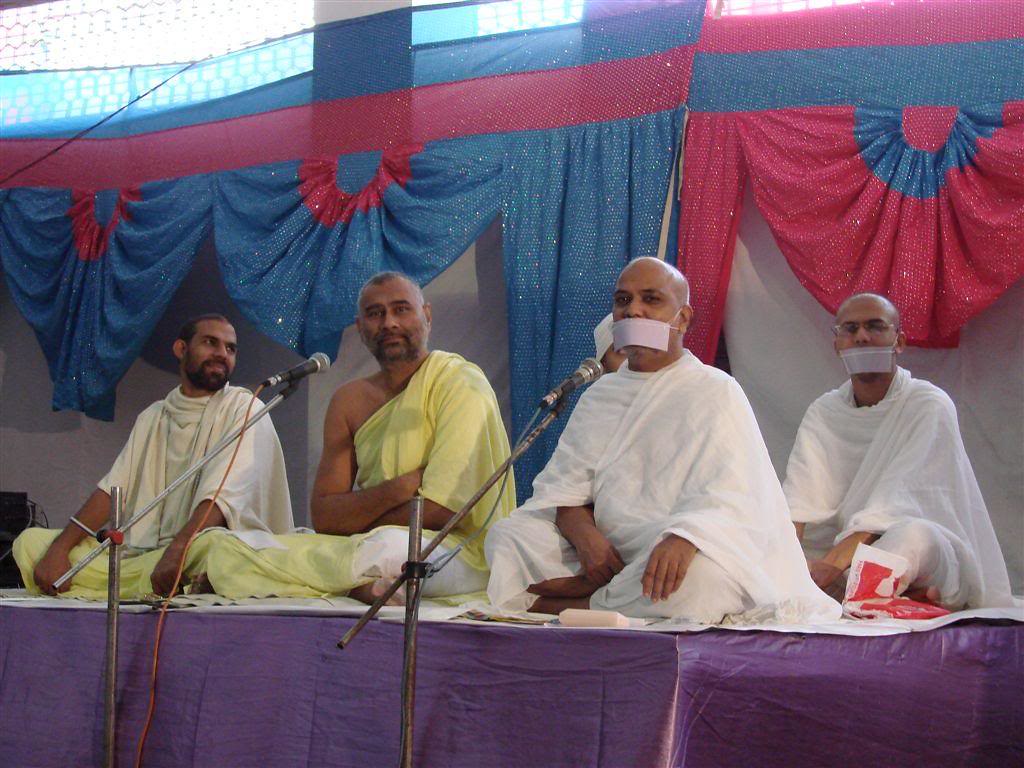 Muni Udit Kumar (front, right) Muni Prasham Kumar (right, behind)
Muni Udit Kumar (front, right) Muni Prasham Kumar (right, behind)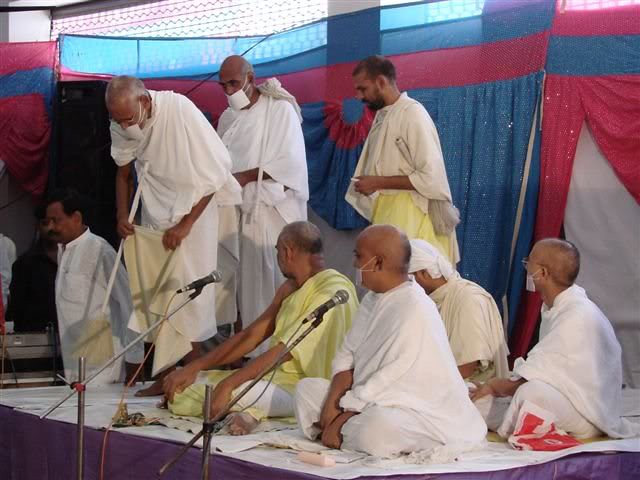 Function of different Jain communities on Ahimsa, arrival of two Sthanakvasi Munis
Function of different Jain communities on Ahimsa, arrival of two Sthanakvasi MunisBoth of them, together with Murti Pujaks Acharya Yasobhahuji and Muni Panyas Dharmshree Rajeshwar were already sitting on the table, and two Sthanakvasi monks just were arriving. The event was organised at Anuvrat Bhawan New Delhi by Jain Mahasabha. Its motto was “Forgiveness and Non-Violence”.
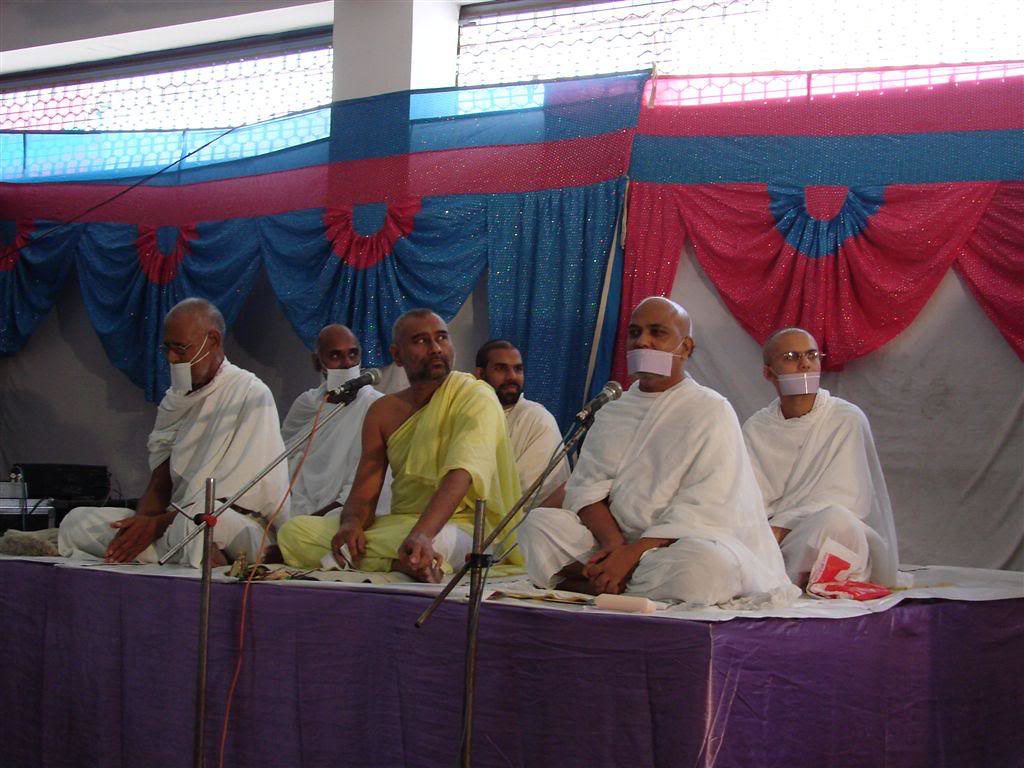 Munis from 3 different Jain Swetamber sects together in Ahimsa function
Munis from 3 different Jain Swetamber sects together in Ahimsa function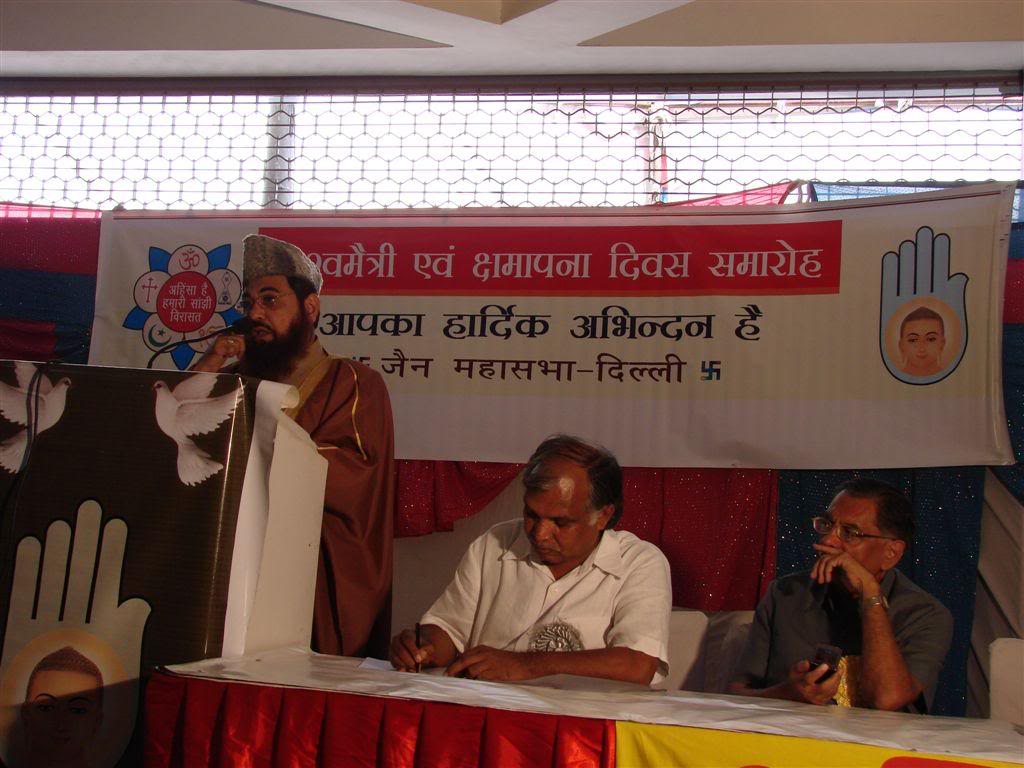 Representant of Delhi Muslim community in his speech in Ahimsa function
Representant of Delhi Muslim community in his speech in Ahimsa functionOn one side, there were six Jain monks on the table, on the other side the lay followers were on the podium, among them a member of New Delhi Muslim community who also delivered a speech.
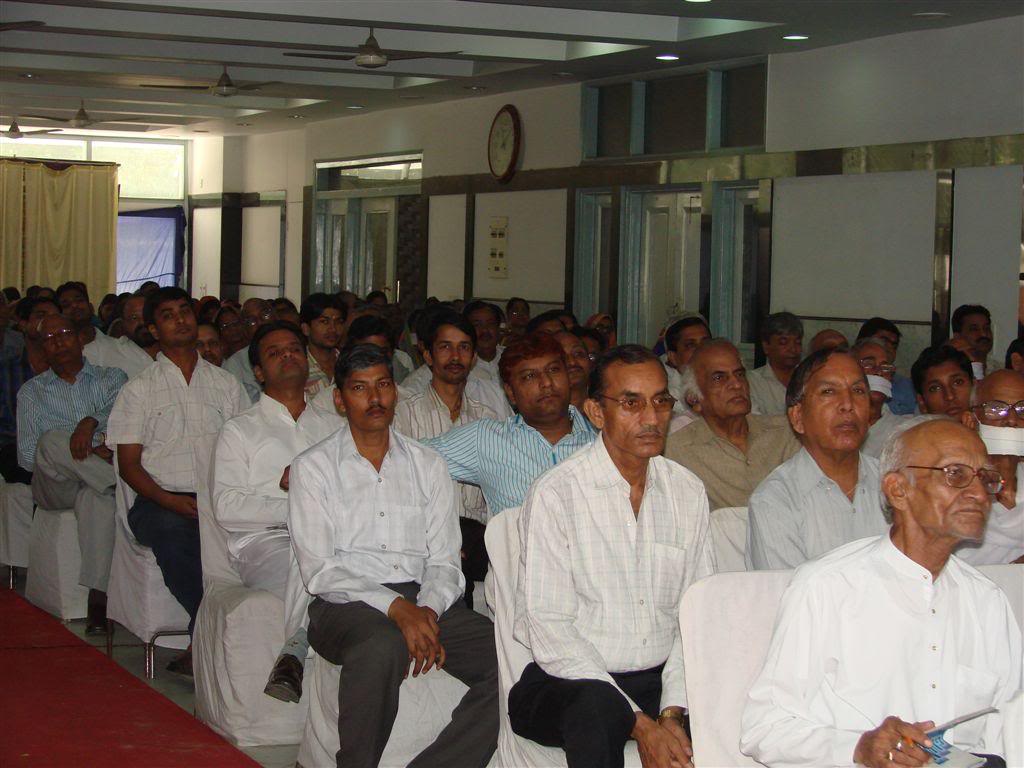 Male audience
Male audience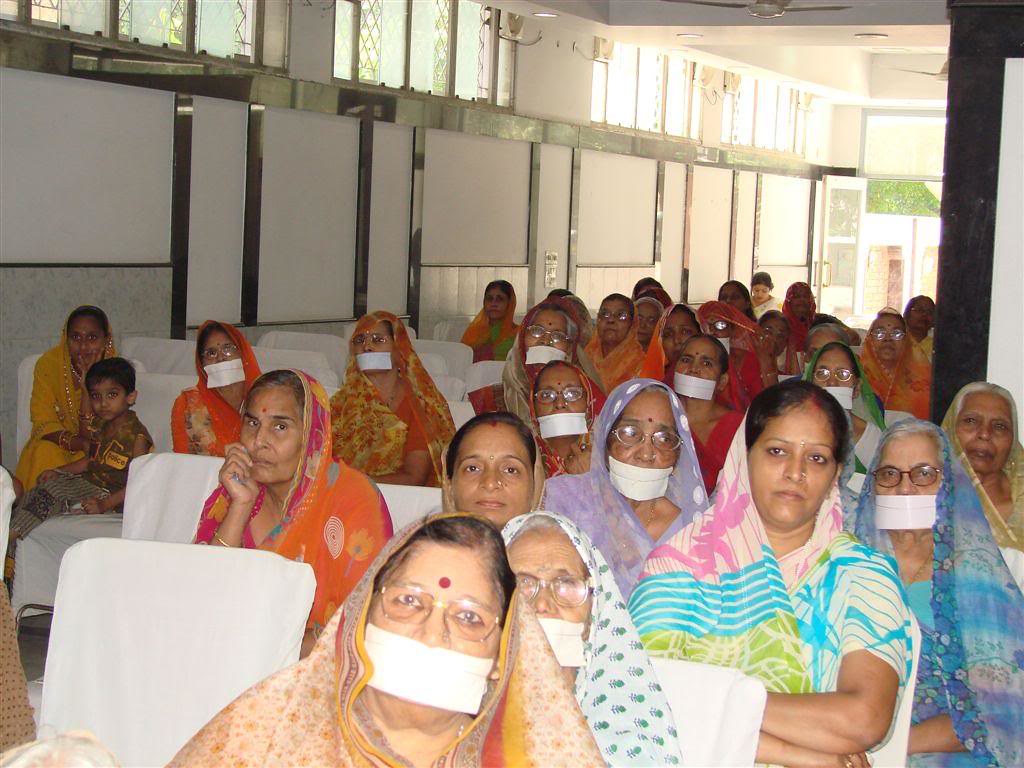 Female audience
Female audienceJain Mahasabha had organised the event at the conclusion of Paryushan for all members of the whole New Delhi Jain community. First, the lay followers addressed the audience, then the saints. I am sorry not being able to report on the lectures as they were given in Hindi.
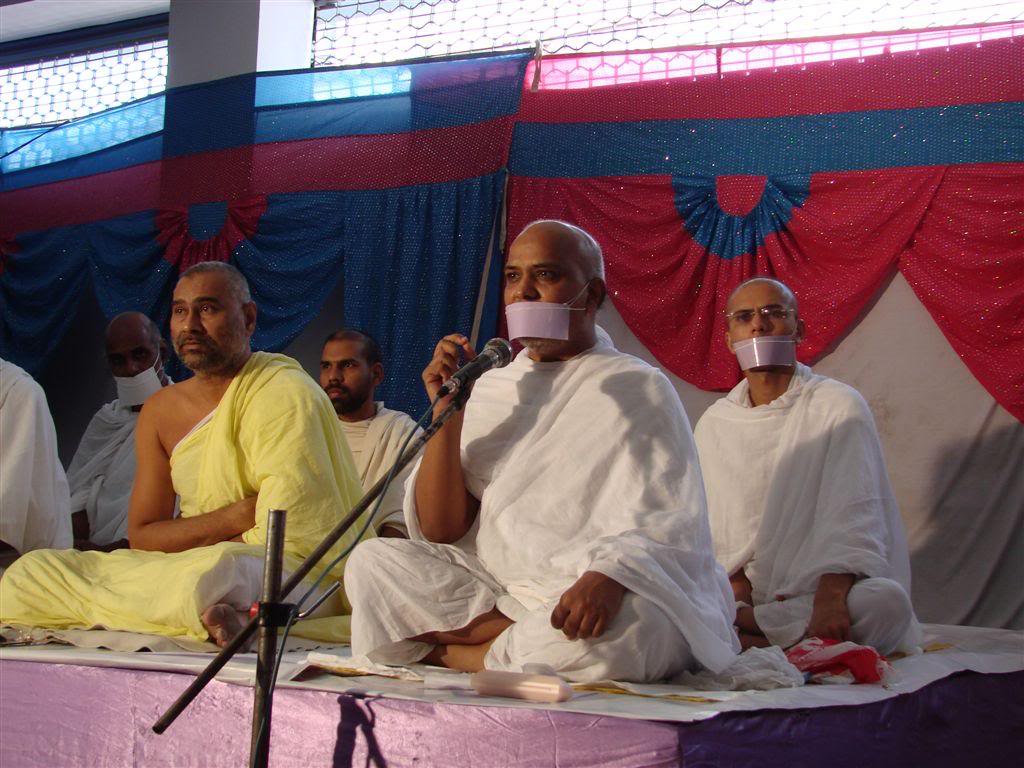 Acharya Yashobarji, Muni Udit Kumar, behind him Muni Prasham Kumar
Acharya Yashobarji, Muni Udit Kumar, behind him Muni Prasham Kumar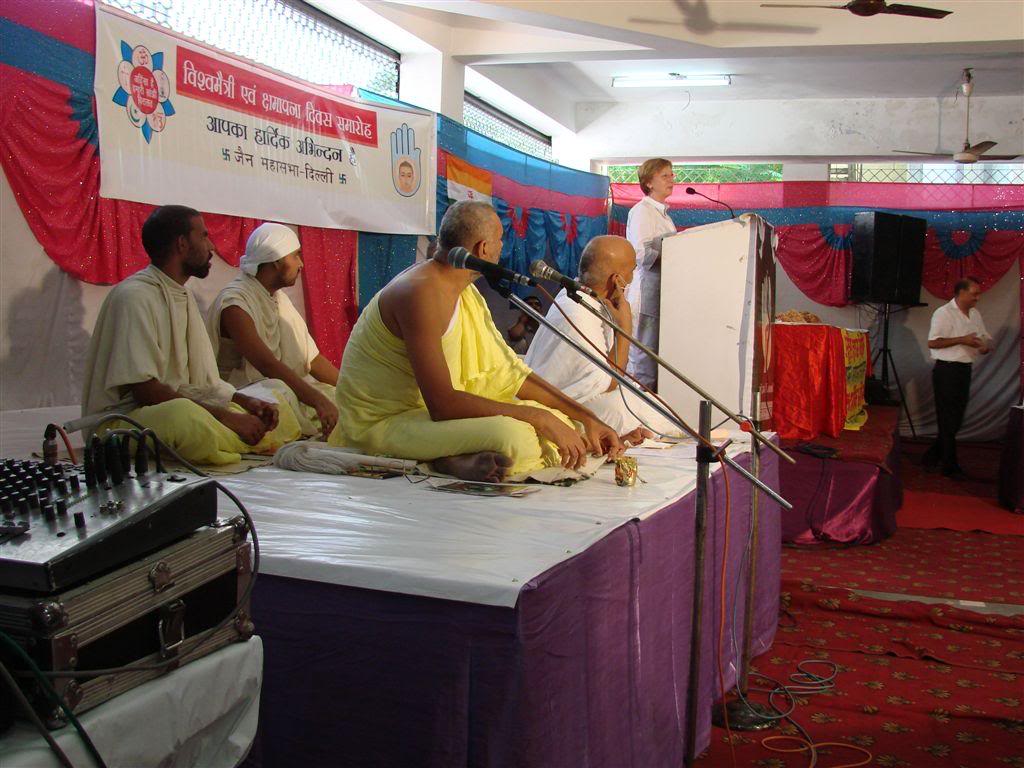 Karuna addresses the audience in Ahimsa function
Karuna addresses the audience in Ahimsa functionAfter Munishree Udit Kumarji had delivered his lecture on fearlessness, forgiveness, and amity, I also was asked to address the audience with some remarks on non-violence:
Non-violence can be practised individually as well as socially. Individually it can be realised through the insight that all negative attitudes are manifestations of the five inner enemies, fear, anger, greed, envy, and egoism. They are the source of energy for all negative thoughts, words, and actions. To recognise them and to deny them any influence on our life is the base for developing a non-violent consciousness, which enables us to recognise them as what they are, negative attitudes hindering us to lead a happy and meaningful life. The moment we start to disclose them, the fight against the true enemies of man has begun and the fighting against windmill aisles has come to an end.
Socially, non-violence can be practised by no longer consuming products created by application of violent means or serving violent practices. This means that we perhaps have to say good-bye to some dear habits, but isn’t it worth to think about these habits than to take a life without even thinking about?
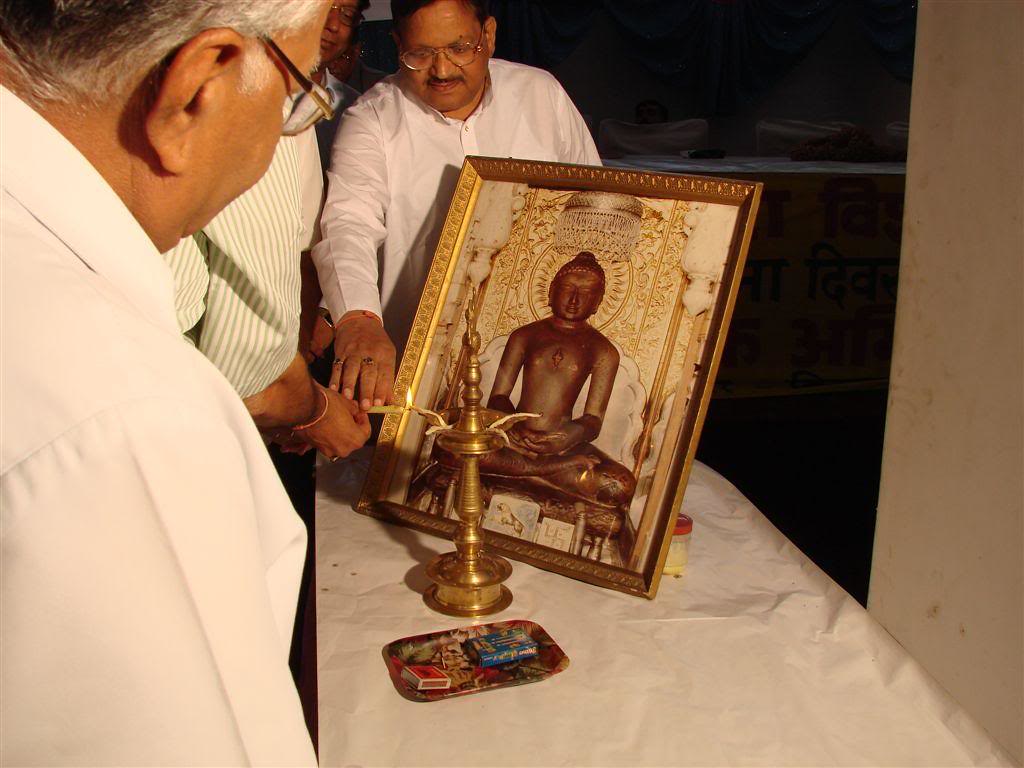 Memebers of Delhi Oshwal community performing light ceremony in front of Lord Mahavira's picture
Memebers of Delhi Oshwal community performing light ceremony in front of Lord Mahavira's picture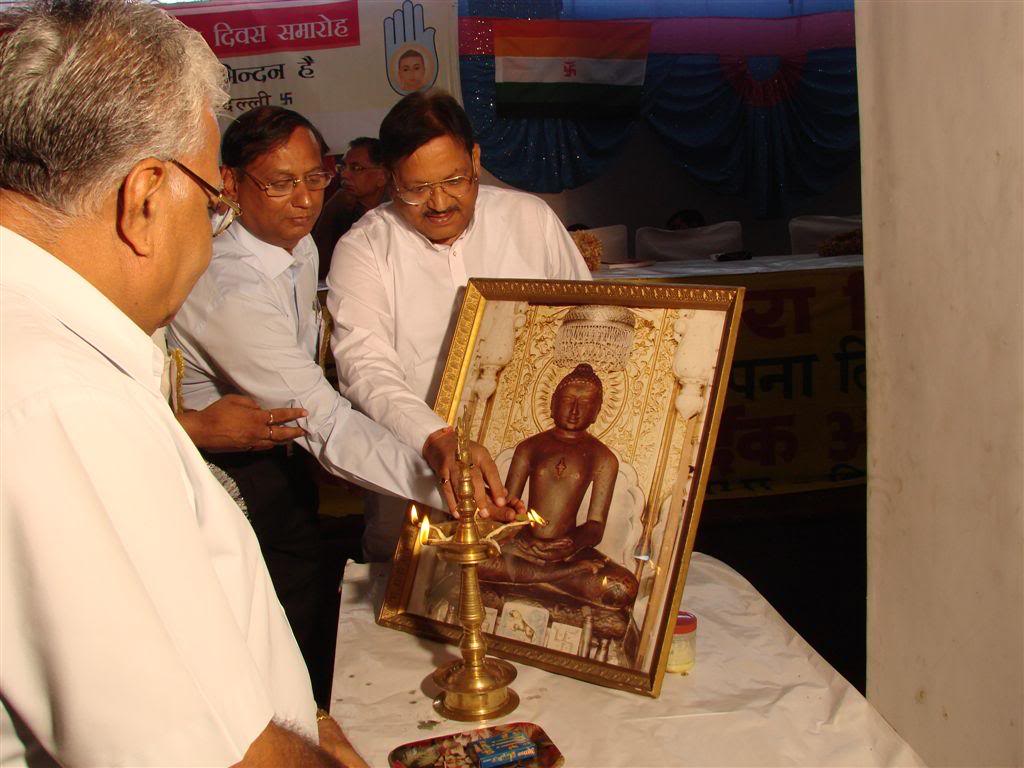 Memebers of Delhi Oshwal community performing light ceremony in front of Lord Mahavira's picture
Memebers of Delhi Oshwal community performing light ceremony in front of Lord Mahavira's pictureLightening of four candles posed under an image of Lord Mahavira concluded the ceremony.
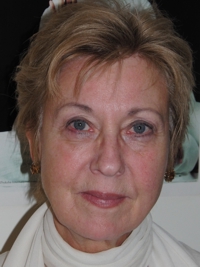 Editor Carla Geerdes
Editor Carla Geerdes
